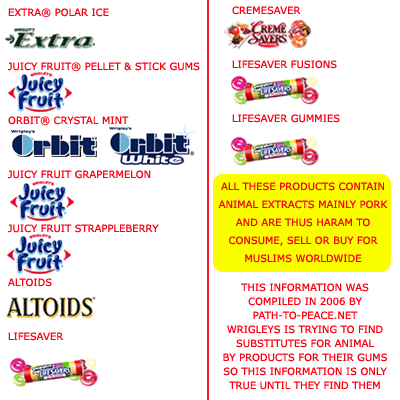Halal Haram List Of Ingredients To Avoid

Since the early 1900s the food industry has undergone major advances that have led to more than half of the shelves in a modern supermarket being stocked with packaged and processed foods. These boxed, canned, and frozen foods achieve their convenience by using a number of food ingredients and processing aids. The original sources and the details of their processing prior to inclusion in the final food product are not provided to consumers but will determine their acceptability for both halal and kosher food production.
While additives are generally declared on a product label, processing aids are not shown on the ingredient statement and thus the consumer is not even aware of their presence. Some additives can be legally grouped into generic categories (such as spices) that also make it difficult for consumers to determine what exactly is in the products they buy and how these products have been processed.  Thus, consumers need to put more pressure on the kosher and halal marketing system to use trademarked symbols that represent an organization that the consumer can hold accountable and which provides both the companies and the consumer with confidence in the kosher and/or halal status of the products being offered in the marketplace. Introduction and Background For many years, and even today, in many Muslim majority countries obtaining halal food simply meant buying meat from a halal butcher who locally slaughtered the animal in accordance with Islamic principles, and meeting the local standards.
Thus, consumers need to put more pressure on the kosher and halal marketing system to use trademarked symbols that represent an organization that the consumer can hold accountable and which provides both the companies and the consumer with confidence in the kosher and/or halal status of the products being offered in the marketplace. Introduction and Background For many years, and even today, in many Muslim majority countries obtaining halal food simply meant buying meat from a halal butcher who locally slaughtered the animal in accordance with Islamic principles, and meeting the local standards.
Other foods that were not prepared at home were prepared by Muslims in the community. So the link between consumer and producer was direct. The kosher consumer also obtained food locally from purveyors in the community so that the local religious leaders could easily supervise food production even if produced by a non‐Jewish processor or merchant. Now halal has become a global megatrend as the food supply is more often than not no longer produced locally, even in developing countries. Sanyo tool reset bq8030 datasheet lm35.

Thus, providing halal foods to about a quarter of the world's population offers many economic opportunities for the food industry, but it makes assuring the halal authenticity of these products more difficult. The kosher consumers, who are a subset of the Jewish community, have developed a system of trademarked labeling on packages of food to identify the responsible party providing kosher certification. Thus, the degree of accountability for kosher foods is often fairly high, although improvements are still needed. The development of a similar trademarked identification system for halal products is still in its infancy as discussed later. The kosher and halal food laws have been described in detail by Regenstein and others ( ) and deal with the allowed animals with the pig being the commercially important unacceptable animal. All allowed mammals and birds must be religiously slaughtered.